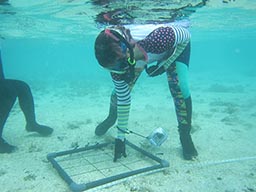- ABOUT US
- PROGRAM AREAS
- CONSERVATION APPROACH
- EDUCATION
- MULTIMEDIA
Sea The Future: Attending Capitol Hill Ocean Week
By Madyson Miller, Knauss Fellow and Caroline Donovan, Communications Director, Coral Reef Conservation Program
In October of 1972, environmental history was made on Capitol Hill. The Marine Mammal Protection Act and the Clean Water Act, among others, were passed and for the past fifty years have helped sustain and maintain our oceans, coasts, great lakes, and waterways. Capitol Hill Ocean Week (CHOW) 2022 was not only special because it was the first in-person meeting since the start of the pandemic, but it was also a celebration of the past 50 years of marine and freshwater conservation. And, over the past 50 years, our oceans have felt the effects from numerous environmental pressures such as climate change and marine debris.
Organized by The National Marine Sanctuary Foundation, Capitol Hill Ocean Week gave managers, scientists, policymakers, and ocean advocates a space to brainstorm innovative solutions that will float us into a better, brighter future. The Coral Reef Conservation Program's (the Coral Program's) Caroline Donovan (Communications Director) and Madyson Miller (Knauss Fellow) attended CHOW 2022 in-person and are feeling optimistic about the future of U.S. coral reefs and oceans.

Madyson Miller: This year was my first time attending Capitol Hill Ocean Week and I can honestly say that the speakers, panels, and enthusiasm for building a stronger future blew me away. The week started off with a panel titled Sea: The Future that explored the biggest ocean issues, followed by a detailed discussion on creative and innovative ways to tackle these problems. There was an overall theme to re-define ocean narratives, challenge our imagination, and develop transparent voices for a transformative future.
Caroline Donovan:I particularly liked the opening session with the lightning talks. Nai'a Lewis' talk about innovating beyond integration into co-creation was great! She ended her talk explaining how art can help us expand our thinking so we can conceive solutions that we couldn't have in the past. Really out-of-the-box thinking.

Madyson Miller: I was moved by the acknowledgement of indigenous practices during panels such as Expanding Ocean Knowledge and Fishing, Swimming, Drinking: Why Clean Water Matters. During the conference, I was able to immerse myself with new knowledge on topics I am not familiar with, including how offshore-wind companies are working to ensure access to this resource. The success of the Biden-Harris Administration's America the Beautiful initiative, including conserving at least 30 percent of our lands and waters by 2030, depends on engaging and collaborating with local community stakeholders. Decarbonizing the grid would be a big advancement to all communities.
Caroline Donovan:Yes, it seems like a lot of the coral reef jurisdictions and territories were well represented at the conference since coral reefs are integral to indigieous communities. What about the session on seafood and fisheries called Food from the Sea? The panelists were from a variety of places, from totally different parts of the world. I really liked how they connected seafood with food security. I feel like most people think of food security in terms of crop yields. The second day session called Wild Waters that included NOAA Administrator Rick Spinrad and Assistant Secretary Shannon Estenoz, Fish and Wildlife, Department of the Interior, was also really interesting to me. Hearing the perspective of federal agencies about coming together along with nonprofits and academic institutions on ocean policy and America the Beautiful (30 x 30) helped clarify how we're going to make it happen.

Madyson Miller: Overall, my CHOW experience was informative and educational. It allowed me to network and have open discussions with my peers. I am eager to take this knowledge and apply it to my favorite ocean resource, coral reefs.
Caroline Donovan: Same!
About Us

The NOAA Coral Reef Conservation Program was established in 2000 by the Coral Reef Conservation Act. Headquartered in Silver Spring, Maryland, the program is part of NOAA's Office for Coastal Management.

The Coral Reef Information System (CoRIS) is the program's information portal that provides access to NOAA coral reef data and products.
Work With US
U.S. Coral Reef Task Force
Funding Opportunities
Employment
Fellowship Program
Contracting Assistance
Graphic Identifier
Featured Stories Archive

Access the archive of featured stories here...
Feedback
Thank you for visiting NOAA’s Coral Reef Conservation Program online. Please take our website satisfaction survey. We welcome your ideas, comments, and feedback. Questions? Email coralreef@noaa.gov.
Stay Connected
Contact Us
NOAA’s Coral Reef Conservation Program
SSMC4, 10th Floor
1305 East West Highway
Silver Spring, MD 20910
coralreef@noaa.gov
